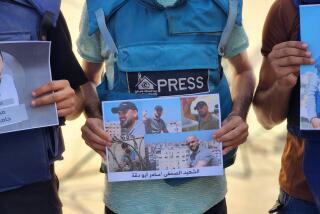Reckless Provocations
- Share via
The worst violence between Israelis and Palestinians in four years has escalated from localized rioting into a widening mini-war, with each side, as usual, blaming the other for failing to curb the deadly confrontations. What is not in dispute is the event that precipitated the explosion. That was last Thursday’s recklessly provocative visit to Islamic holy sites in Jerusalem by Ariel Sharon, right-wing leader of the Likud Party and an unyielding opponent of territorial and political concessions to the Palestinians. Sharon is despised by Palestinians--and was accused by an Israeli investigating commission of “personal responsibility”--for failing to prevent the massacre of thousands of Palestinian refugees by Lebanese Christian militiamen after Israel’s 1982 invasion of Lebanon.
Sharon disingenuously claims he went to the Temple Mount, which Muslims call the Noble Sanctuary, as a gesture of peace, to show that any citizen of Israel, Jew or Arab, is free to go anywhere in the country. Sharon is not naive. He knows his reputation among Palestinians, and he knew that his well-publicized and heavily protected visit to Islam’s third holiest shrine would offend Muslim religious sensibilities and incite political passions. It did. Rocks were thrown, Jewish worshipers at the Western Wall were menaced, shots were fired. And from extremists on both sides came the familiar refrains: Israelis can’t be trusted, Palestinians can’t be trusted, the peace process is a sham and should be abandoned.
Peace efforts won’t be abandoned, if only because American and Western European governments insist they be pursued. But active negotiations may well be suspended, perhaps for a long time.
In Israel, Prime Minister Ehud Barak could lose a no-confidence vote when the Knesset reconvenes next month, forcing new elections early next year that could put the forces opposed to the peace process back into power. Palestinian leader Yasser Arafat, whose prestige has sagged as popular frustration with his corrupt, incompetent and often brutal regime has grown, lacks the moral authority to make necessary concessions, assuming he was ever inclined to do so.
The outlook is for deadlock, and maybe worse: a new intifada that might rival in intensity the nearly seven years of bloody confrontations that ended in 1994. That would be a political and human tragedy, benefiting only the rejectionists on both sides who embrace the delusion that force is the answer and compromise is treason.
More to Read
Sign up for Essential California
The most important California stories and recommendations in your inbox every morning.
You may occasionally receive promotional content from the Los Angeles Times.













